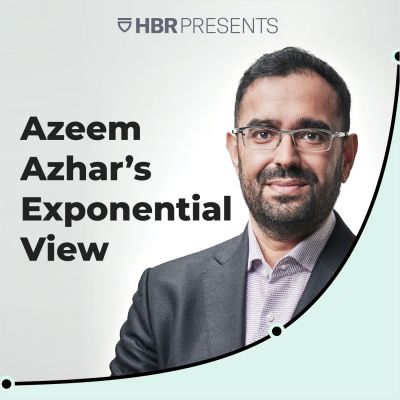How will the future unfold? What is the impact of technology on business & society? As technology reorders the world in which live, who will be the winners and who will be the losers? Join Azeem Azhar, curator of the Exponential View newsletter, in deep conversation with the world's leading thinkers and practitioners exploring these and other important questions. The views expressed on this podcast are those of its hosts, guests, and callers, and not those of Harvard Business Review.
https://hbr.org/podcasts/exponential-view
Gesamtlänge aller Episoden: 5 days 3 hours 47 minutes
episode 10: Doughnut Economics, Rethinking Economics for the 21st Century
Kate Raworth, senior visiting research associate at Oxford University’s Environmental Change Institute, discusses the Doughnut economics framework as the essence of rethinking economics for a world inhabited by 10 billion people and hit by climate change and social justice struggles. Kate sets a vision for an equitable and sustainable future.
episode 11: Diplomacy in the Tech Age
Casper Klynge, the world's first tech ambassador, with a global mandate and staff in Copenhagen, Silicon Valley, and Beijing, assesses the current alignment between some of the largest technology companies and nation-states and discusses the role of technology in fostering democracy and innovation.
episode 12: Renewable Energy, Climate Change, and Technology
Michael Liebreich, a leading global expert on clean energy and transportation, discusses the significance of the U.S. National Climate Assessment and IPCC's report, the importance of staying below two degrees, and the role of exponential technologies in transitioning to renewables.
episode 13: Quantified Self, Data Ownership, and the Sociological Approach to Technology
Gina Neff, a senior research fellow and associate professor at the University of Oxford, explores technology development from a sociological perspective, as well as the implications of self-tracking and the quantified self for the individual and society.
episode 14: The State of Artificial Intelligence
Jack Clark, the policy director at OpenAI, discusses the state of artificial intelligence development, the geopolitics of technology, and the implications of automation on society.
episode 15: Making Sense of the Data-Rich World with Graph Databases
Emil Eifrem is the CEO and cofounder of Neo4j, the graph database platform powering some of the largest companies today. He is the creator of the property graph model, and he coined the term "graph database" to describe the technology that would change how we understand big data.
episode 16: Regulating the Cyberspace
Marietje Schaake, a Dutch politician and member of the European Parliament (MEP) from the Netherlands, talks to Azeem Azhar about the governance of cyberspace, the responsibility of technology companies, and the new era of geopolitical competition in cyberspace.
episode 17: Overcoming the Epistemic Crisis
Elif Shafak, an award-winning British-Turkish author and human rights activist, discusses the polarization of culture springing out of the foundations of the open internet, and the ways to tackle the pervasive issues in today's digital technology sphere.
episode 18: Technology Diffusion and the Rise of Asia
Parag Khanna, a leading international relations expert, recently published the new book "The Future Is Asian: Commerce, Conflict and Culture in the 21st Century." He talks about the law of technology diffusion, breaks common myths about Asia's development, and questions whether the future belongs to cities or nation-states.
